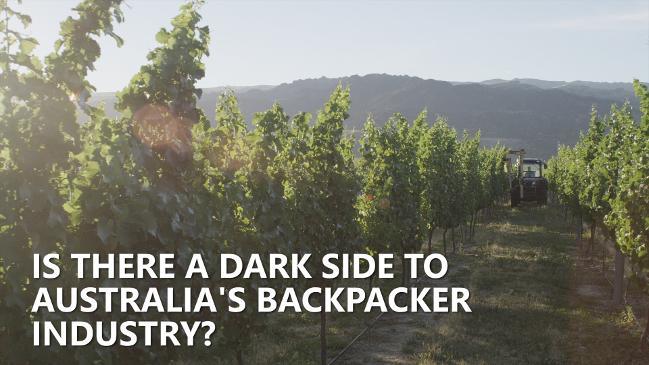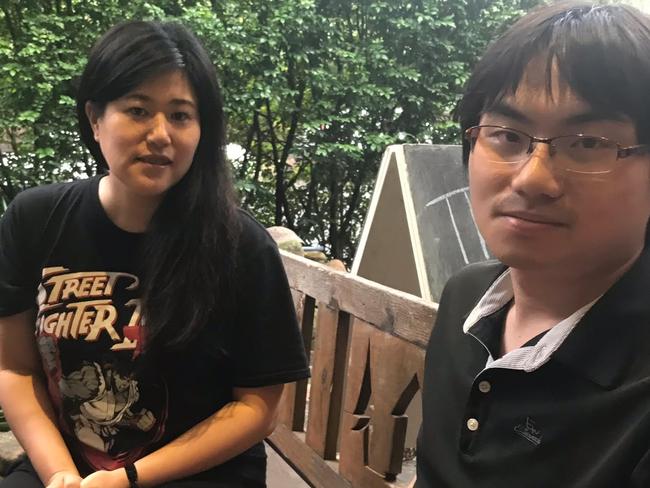Crime gangs target backpackers in working holiday visa rort
BACKPACKERS are handing over thousands of dollars in a visa fraud allowing them to stay in the country to work on farms when in reality they never leave the city — with one traveller sucked into the scheme admitting: “I was completely stupid.”

Crime in Focus
Don't miss out on the headlines from Crime in Focus. Followed categories will be added to My News.
AN organised crime syndicate is targeting Australia’s Working Holiday Maker visa program enticing backpackers to pay thousands of dollars for bogus documents to extend their stay.
The rampant fraud involves using the ABN numbers of Australian farmers and rural businesses to claim the backpackers have been working for those businesses, even though they have never left the city.
Backpackers around the country are understood to have been targeted by the syndicate offering a one-stop-service to obtain a second-year working holiday visa.
Working in approved industries such as agriculture in rural areas for 88 days can be used by backpackers to obtain a second-year working visa.
German backpacker Emma, whose name has been changed to protect her identity, fell victim to the syndicate after being convinced the scheme was not “totally illegal”.
The 22-year-old paid $1750 for bogus documents after being told the farmer would employ another worker for cash in her place, and the farmer would pay the tax in her name.
“My housemates had all used him to successfully obtain second-year working visas and so had others that I knew,” said Emma. “I am just one of many.”
Emma said the frontman for the Chinese syndicate, known as “Ben”, told her that he was working with people inside the Department of Home Affairs as well as with the farmers.
Ben lodged the bogus documents on her behalf and within “one minute” she was granted a visa extension.

Emma discovered that Ben and his network had been in business for at least six years and the backpackers who referred new clients to Ben also earned a commission of up to $200 each.
She decided to reveal the details of the fraud after being caught out when she applied for a study visa to stay on in Australia.
The Department of Home Affairs discovered the bogus documents and have banned her from entering Australia again for three years. Now she wants to warn others and help the Federal Government to stop the fraud.
True Crime Australia: ‘He’s innocent’ — Defence lawyer haunted by murder conviction
Comanchero’s memorial: Brutal history of bikies buried at $230k gravesite
Belgian backpacker Lionel Scalais said he has heard of many backpackers getting a second year by “paying for a paper” and that it worked for them. But Lionel insisted he did not. He worked in Bundaberg on a farm. “I followed the rules,” he said.
Backpacker Wei from Hong Kong, who has also undertaken legitimate farm work to obtain a second year working holiday visa, said he had heard about others paying up to $3000 for documents. Wei and his friend Emi from Japan, both said the requirements to work 88 days was hard to complete and many people they knew had given up.
“They are losing really good people, because it is too tough,” said Emi.

Anne O’Donoghue, an accredited immigration law specialist with more than 25 years of experience in the industry, said Emma’s case was not an isolated one.
Ms O’Donoghue said she has seen a lot of people who have paid third parties to falsely say they work in rural areas, and they had come to her in a state of distress over what they have done.
“They are young, vulnerable people who are being preyed on, have made a mistake, and are distressed about the consequences,” she said.
Some backpackers have also revealed once their bogus documents were lodged and they had successfully received their second-year visa, they were trapped and being hit up for further payments by the fraud syndicate.
The fraudulent use of bogus documents to illegally claim a second-year working visa appears to have been operating for years.
The former Department of Immigration, now Department of Home Affairs, set up a specialist integrity unit almost 10 years ago to fight what was then identified as widespread fraud in the working holiday visa system.
At the time more than 200 internet advertisements had been discovered offering to buy and sell documents which falsely claimed that they had worked in rural jobs.
FOLLOW: True Crime Australia on Facebook and Twitter
The Department of Home Affairs has not responded to questions about whether the integrity unit is still in existence, or if it is interested in obtaining the details of the crime syndicate.
The Department also declined to answer questions about the how many fraudulent visa applications have been identified or how many visas have been cancelled.
Nor has the department answered questions about the number of people identified running the scams or whether any have been prosecuted.
Minister for Immigration Citizenship and Multicultural Affairs David Coleman and Home Affairs Minister Peter Dutton did not respond to requests for comment.
A spokeswoman for The Department of Home Affairs did say the department continues to work closely with a range of agencies and international partners in our efforts to combat visa fraud.
“The majority of scammers seek financial gain by promising an Australian visa, citizenship and/or employment in Australia or requesting payments be made under the guise of an official immigration officer,” she said.
“They may also design fake websites that appear like official government sites. The best defence against these scams is an informed public.”
HOW THE SCAM OPERATES
EMMA had been expecting the call.

When she answered, the 22-year-old spoke to a man going by the name of Ben.
They made arrangements to meet at Darling Harbour in Sydney in front of the ICC building.
Ben told her to bring the cash and her passport.
Emma had been referred to Ben and his crime syndicate by her backpacker housemates.
They had all been granted second-year working visas after paying Ben and the syndicate to produce bogus documents claiming they had worked in rural areas.
She was told Ben and the syndicate had been in business for years and even paid commissions of up to $200 to backpackers who brought new paying recruits to them.
Ben kept a distance from new recruits until he could verify them. Backpackers referring a new backpacker wanting a visa would ring him and pass him the new name and phone number. Ben would then ring them and make the arrangements.
Emma said the man she met at Darling Harbour was Asian with dark brown hair, a tan, and about 170cm tall.
He was skinny, wearing jeans, baggyish clothes and a baseball cap pulled low over his face.
Emma handed over the money and her passport but never saw the paperwork.
Ben said he would take care of everything. He said he would create a new account and submit the papers on my behalf.
When he did that, he listed her email as the contact point. Emma said she received a confirmation email when the application for the visa was submitted and within “one minute” she received a notice from the Department that it had been granted.
The receipt she received online has the name and credit card details of the person who paid the $444.31 application fee on her behalf for the visa application.
Emma said she also has the name of farmers and businesses that were given to her as being complicit in the scam, along with the bank account details of another Chinese member of the syndicate.
She now wants to warn others that their future could be compromised if they do ever want to return to Australia.
“I was completely stupid, I know that now,” said Emma.
“I am happy to help the Department and have offered to give them all the information that I have.”
BY THE NUMBERS
Originally published as Crime gangs target backpackers in working holiday visa rort
